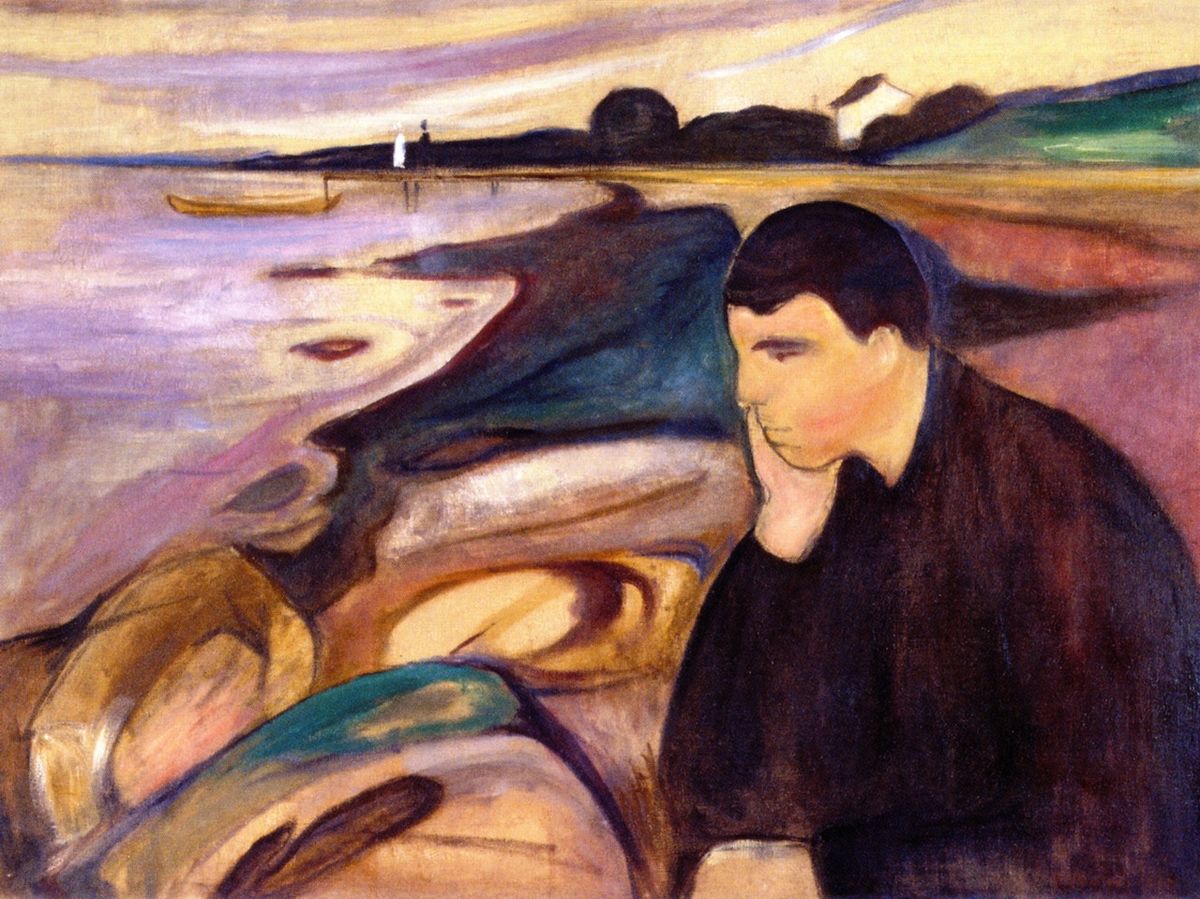FRANCES FAHY
I was writing a piece when I realised that the song ‘The Parting Glass’ had started pecking at my brain like a robin at the window. For those who don’t know this song, it’s said to be of Scottish origin but the Irish have long made it their own as a ballad that’s meant to release some of the tension and grief of, say, a wake or an emigration salute.
‘I’ll listen to it in the background as I write,‘ I said to myself. Then I started to think: ‘It will only make me melancholy‘, and ”Is that what I want right now?’ So instead of listening to it and singing along, I found myself running with my reflections on the nature and the point of melancholy.
The Greek root melankholia means deep sadness, but it also means ‘black bile’, a bodily secretion of the liver believed in Medieval physiology to cause people to feel ‘down in the dumps’ as they say. The French poet Baudelaire referred to it as Spleen. Another organ situated near the liver, the spleen is responsible for the immune functions of the body and in Baudelaire’s works is used to represent the anguish, the anger, the melancholy and overall dissatisfaction with life, its mysteries, contradictions and its tortures. So bodily organs do contribute to feeling down which means we can’t always just ‘snap out of it.’ And that itself is comforting. Going even further, a melancholic personality means a person is too bogged down with physical and emotional baggage to go about life in a healthy manner and often chooses to remain in this state or lacks the energy to fight it. We need and enjoy time out for reflection, but reflection will inevitably connect to both painful and pleasurable feelings about what we have lost and continue to long for. This we can call melancholy. Only in later life have I understood that my own small rural Irish village was a haven for melancholic characters, people who shied away from social interaction, who could sit for hours brooding and even smiling at the fire in reverie and forgetting there was someone else present.
Melancholy can also mean ‘knowingly sad’, a sadness one can desire and summon up as a way to cling to the loss of a loved one long after the event itself. So, too, with the physical pain connected to the ardour of religious fervour that can never be appeased. Melancholic people can latch on as easily to the pain of others as much as to their own. There are people who even enjoy funerals, and are transfixed by raw grieving. Melancholy provides an opportunity for indulgent and uplifting self-reflection or self-pity in some cases. It involves both painful and pleasurable feelings that mere sadness does not. It often excludes awareness of the exact reasons for a negative feeling. So knowingly deciding to go into the sadness that a particular song, film, reading, photo or event will conjure up can reflect where a person stands in relation to their personal grief, as opposed to the generic grief associated with war, exile or the grief we ‘feel’ for things long past and that we had no direct experience of and that, for the most part, we keep safely stowed away.
In the case of Ireland and its history, there are layers of grief that we regularly tap in to, such as the Famine of the 1840s, the baby market drama, the government sanctioned evictions, survivors’ guilt and on and on. Knowing that such atrocities are ongoing in other countries today we may feel an almost masochistic need to dwell on them. Most people manage this universal grief by blocking it out and by choosing when to listen to or sing ‘The Parting Glass’ or ‘The Fields of Athenry’ or whatever and so avoid having to justify their sadness. Alcohol and its relationship to melancholy has also long been studied and the pub is a place where brooding is, for the most part, condoned.
The English scholar Robert Burton (1577 – 1640) said he wrote ‘The Anatomy of Melancholy’ in 1621, largely to write himself out of being a lifelong sufferer from depression. “I write of melancholy, to be busy enough to avoid melancholy. There is no greater cause of melancholy than idleness, no better cure than business.”
In Burton’s view, melancholy was “a disease so frequent … in our miserable times, as few there are that feel not the smart of it”, and he said he compiled his book “to prescribe means how to prevent and cure so universal a malady, an Epidemic disease, that so often, so much crucifies the body and mind.” For Burton, melancholy describes a range of mental abnormalities, from obsession to delusion to what we would now call clinical depression. He warns that the multitude of remedies are all ultimately useless and self-contradictory and that the agonising longing for what is lost and irretrievable that we may indulge in is more tolerable than the emptiness of accepting the finality of loss.
So, listening to The Parting Glass or Sliabh na Mban or any of the hundreds of other melancholic songs, the fado, as the Portuguese call them, is not a sign that we are weak or overly sentimental. It’s a sign that we are recognising a need that we may not even understand or question and are giving our spirit the continuous dose that helps it cope with both personal grief and with the unending bombardment of universal grief that is foisted on us.
From the author’s blog https://francesfahywritings.wordpress.com/2023/04/23/is-bringing-melancholy-on-ourselves-useful/


